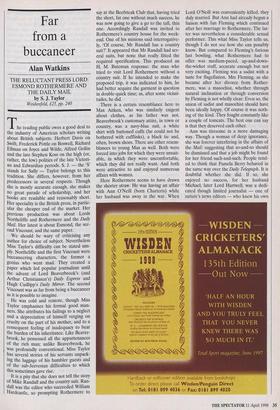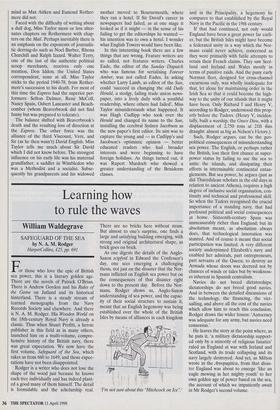Far from a buccaneer
Alan Watkins
THE RELUCTANT PRESS LORD: ESMOND ROTHERMERE AND THE DAILY MAIL by S. J. Taylor Weidenfeld, £25, pp. 240 The reading public owes a good deal to the industry of American scholars writing about British subjects: Herbert Davis on Swift, Frederick Pottle on Boswell, Richard Ellman on Joyce and Wilde, Alfred Gollin and the late Stephen Koss on the high (or, rather, the low) politics of the late Victori- an and Edwardian periods. S. J. — the IS' stands for Sally — Taylor belongs to this tradition. She differs, however, from her predecessors in several respects. Though she is mostly accurate enough, she makes no great parade of scholarship, and her books are readable and reasonably short. Her speciality is the British press, in partic- ular the cheaper end of the market. Her previous production was about Lords Northcliffe and Rothermere and the Daily Mail. Her latest is about Esmond, the sec- ond Viscount, and the same paper.
We should be wary of criticising any author for choice of subject. Nevertheless Miss Taylor's difficulty can be stated sim- ply. Northcliffe and the first Viscount were buccaneering characters, the former a genius who went mad. They created a paper which led popular journalism until the advent of Lord Beaverbrook's (and Arthur Christiansen's) Daily Express and Hugh Cudlipp's Daily Mirror. The second Viscount was as far from being a buccaneer as it is possible to imagine.
He was cold and remote, though Miss Taylor emphasises his formal good man- ners. She attributes his failings to a neglect and a depreciation of himself verging on cruelty on the part of his mother, and to a consequent feeling of inadequacy to bear the burden of his inheritance. Like Beaver- brook, he possessed all the appurtenances of the rich man; unlike Beaverbrook, he was profoundly conventional. Miss Taylor has several stories of his servants unpack- ing the luggage of his humbler guests and of the sub-Jeevesian difficulties to which this sometimes gave rise. It is a pity that she does not tell the story of Mike Randall and the country suit. Ran- dall was the editor who succeeded William Hardcastle, so prompting Rothermere to say at the Beefsteak Club that, having tried the short, fat one without much success, he was now going to give a go to the tall, thin one. Accordingly Randall was invited to Rothermere's country house for the week- end. One of his minions said interrogative- ly, 'Of course, Mr Randall has a country suit?' It appeared that Mr Randall had sev- eral suits, but none that really fitted the required specification. This produced an H. M. Bateman response: the man who tried to visit Lord Rothermere without a country suit. If he intended to make the proposed trip, it was indicated to him, he had better acquire the garment in question in double-quick time; as, after some vicissi- tudes, he did.
There is a certain resemblance here to Max Aitken, who was similarly exigent about clothes, as his father was not. Beaverbrook's customary attire, in town or country, was a navy-blue suit, a white shirt with buttoned cuffs (he could not be bothered with cufflinks), a black tie and, often, brown shoes. There are other resem- blances to young Max as well. Both were forced into jobs for which they were unsuit- able, in which they were uncomfortable, which they did not really want. And both were attractive to and enjoyed numerous affairs with women.
Here Rothermere seems to have drawn the shorter straw. He was having an affair with Ann O'Neill (born Charteris) while her husband was away in the war. When Lord O'Neill was conveniently killed, they duly married. But Ann had already begun a liaison with Ian Fleming which continued after her marriage to Rothermere. The lat- ter was nevertheless a considerable sexual performer. This what Miss Taylor tells us, though I do not see how she can possibly know. But compared to Fleming's furious fast bowling, what Rothermere had to offer was medium-paced, up-and-down- the-wicket stuff, accurate enough but not very exciting. Fleming was a sadist with a taste for flagellation. Mrs Fleming, as she became after her divorce from Rother- mere, was a masochist, whether through natural inclination or through conversion by Fleming is not wholly clear. Even so, the union of sadist and masochist should have been ideally happy. Of course it was noth- ing of the kind. They fought constantly like a couple of tomcats. The best one can say is that they deserved each other.
Ann was tiresome in a more damaging way. Though a woman of deep ignorance, she was forever interfering in the affairs of the Mail: suggesting that so-and-so should be dismissed and that a job might be found for her friend such-and-such. People tend- ed to think that Pamela Berry behaved in the same way over the Daily Telegraph. It is doubtful whether she did. If so, she enjoyed no success, for her husband Michael, later Lord Hartwell, was a dedi- cated though limited journalist — one of nature's news editors — who knew his own mind as Max Aitken and Esmond Rother- mere did not.
Faced with the difficulty of writing about a dull dog, Miss Taylor more or less alter- nates chapters on Rothcrmere with chap- ters on the Mail. Perhaps inevitably there is an emphasis on the exponents of journalis- tic derring-do such as Noel Barber, Rhona Churchill and Ralph Izzard. Walter Terry, one of the last of the authentic political scoop merchants, receives only one mention, Don Iddon, the United States correspondent, none at all. Miss Taylor sticks to the period 1940-78, from Rother- mere's succession to his death. For most of this time the Express had the superior per- formers: Sefton Delmer, Rene McColl, Nancy Spain, Osbert Lancaster and Beach- comber (whom Beaverbrook did not find funny but was prepared to tolerate).
The balance shifted with Beaverbrook's death and the resulting loss of direction at the Express. The other force was the alliance of the third Viscount, Vere, and Sir (as he then wasn't) David English. Miss Taylor tells me much about Sir David which I did not know before. The strongest influence on his early life was his maternal grandfather, a saddler in Wimbledon who was a Methodist and a socialist. Subse- quently his grandparents and his widowed mother moved to Bournemouth, where they ran a hotel. If Sir David's career in newspapers had failed, as at one stage it looked as if it might — in the sense of his failing to get the editorships he wanted his intention was to own a hotel. I wonder what English Towers would have been like.
In this interesting book there are a few things that are wrong. Feature writers are so called, not features writers. Charles Eade, the editor of the Sunday Dispatch who was famous for serialising Forever Amber, was not called Eades. In asking whether Larry Lamb, as editor of the Sun, could 'succeed in changing the old Daily Herald, a stodgy, failing trade union news- paper, into a lively daily with a youthful readership, where others had failed', Miss Taylor misunderstands what happened. It was Hugh Cudlipp who took over the Herald and changed its name to the Sun, installing the cerebral Sydney Jacobson as the new paper's first editor. Its aim was to capture the young and — in Cudlipp's and Jacobson's optimistic opinion — better educated readers who had broader interests and were beginning to have foreign holidays. As things turned out, it was Rupert Murdoch who showed a greater understanding of the Benidorm classes.



































































 Previous page
Previous page